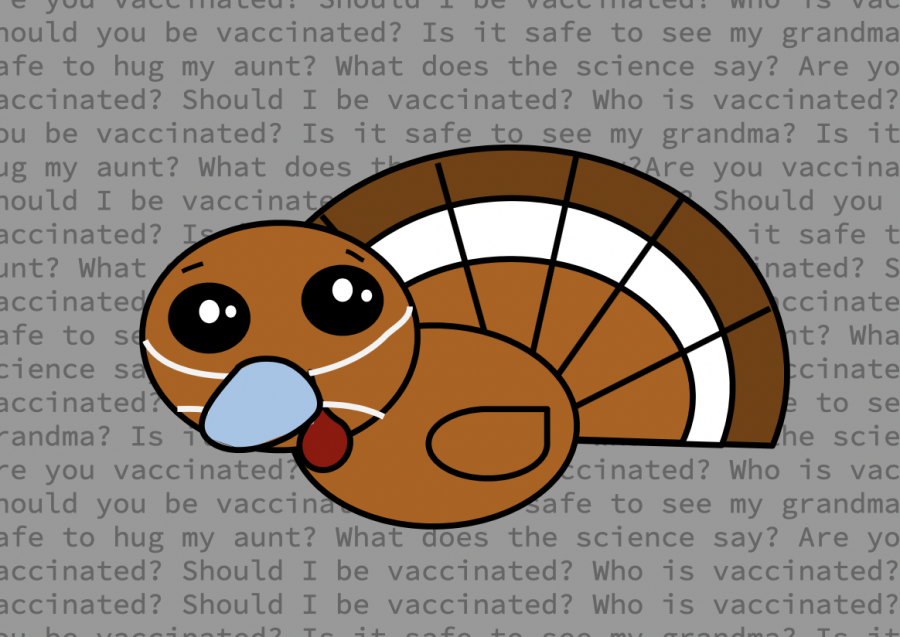Is it safe to go home for Thanksgiving? Experts say yes
November 19, 2021
The leaves have fallen, the wind is chilly, and college students across the country are gearing up to go home or visit loved ones for Thanksgiving break. Then, they’ll return to their campuses and close out the semester with finals week.
Though a normal-sounding phenomenon, this marks a stark difference from last year. For the holiday season of 2020, with the COVID-19 pandemic in full swing, families had to strike the hard balance between seeing their students and COVID precautions.
In many ways, the country has improved by leaps and bounds in the fight against the pandemic, enough so that large gatherings seem to be in vogue again this holiday season.
But, COVID-19 is not gone. In fact, The New York Times reported over 110,000 new cases on Nov. 19 alone.
What has changed since 2020 that makes it safe for students to go home (or wherever) for the holidays this year? Is it actually safe?
The United States’ approval and widespread distribution of vaccines against COVID-19, including to Linfield University community members, has radically changed the way schools can operate yet again. This means allowing students to go home for breaks and return to campus—a big difference from last year.
“With over 94% of Linfield’s students on the McMinnville campus and an even greater percentage of students on the Portland campus, as well as employees, being fully vaccinated—Thanksgiving 2021 looks much different than Thanksgiving 2020,” said Patricia Haddeland, director of Linfield’s Student Health, Wellness, and Counseling Center. “This year, everyone gets to come back to campus for the last big effort and final exams and close out fall term together.”
Unvaccinated individuals had a 6.1 times greater risk of testing positive for COVID-19 and 11.3 times greater risk of dying from the disease compared to fully-vaccinated individuals, according to the most recent data from The Centers for Disease Control and Prevention.
Many take this as a sign of “let’s go back to normal”—including the man who is often regarded as the nation’s top infectious disease expert.
Dr. Anthony Fauci, director of the National Institute of Allergy and Infectious Diseases and Chief Medical Advisor to the President, was asked during an interview on The Daily what his plans for the holiday season were. He said that due to logistics, he and his children were not meeting up for Thanksgiving “but all of [his] daughters, all three, are going to be coming and joining [him] on Christmas.”
For Linfield senior Molly Shields, last year’s quiet Thanksgiving has given her a new appreciation for her family. She said that this year, everyone in her family that is eligible has been vaccinated, giving them the confidence to host a larger gathering again.
“While hosting Thanksgiving for everyone is obviously stressful and a lot of work, I now realize how worth all the chaos it is to simply enjoy each other and be together,” Shields said. “I honestly can’t wait to be at our huge table with too many conversations to follow and probably some screaming children, because that’s my crazy family and family is what Thanksgiving is all about for me.”
Devin Thacker, a Linfield junior, said he is going to Disneyland during Thanksgiving break with his girlfriend and is spending time with his family.
“I’m very excited about getting a break and being able to spend time with friends and loved ones I didn’t get to see this time last year,” Thacker said. “Last year, I was barely able to visit my family because they had children who were very young and my grandfather was high risk so it is nice that I am getting to not only see my family, but to get to go out of state and actually take a break from my studies.”
Although many families are returning to large gatherings or taking vacations, others are still taking precautions. Haddeland said she comes from a large family, and would love to get together with them. However, they decided to keep a smaller circle this year.
“We have family who are immunocompromised and we aren’t going to put them at risk, so for this year, I’m keeping it small with my immediate family of my husband, three sons and their partners,” Haddeland said. “We still plan to see family via FaceTime or Zoom, and look forward to the time when we can gather again with the whole bunch.”
Even with the majority of Linfield community members vaccinated, Haddeland warned that the Delta variant is still a concern.
“We still encourage people to be cautious about who they are around and where they go over the break,” Haddeland said. “In settings where lots of other people are present, such as a concert or shopping mall, consider wearing a mask.”
She also suggested students get tested for COVID-19 if any symptoms, such as cough, fever, or stuffy nose, develop in the coming weeks.

